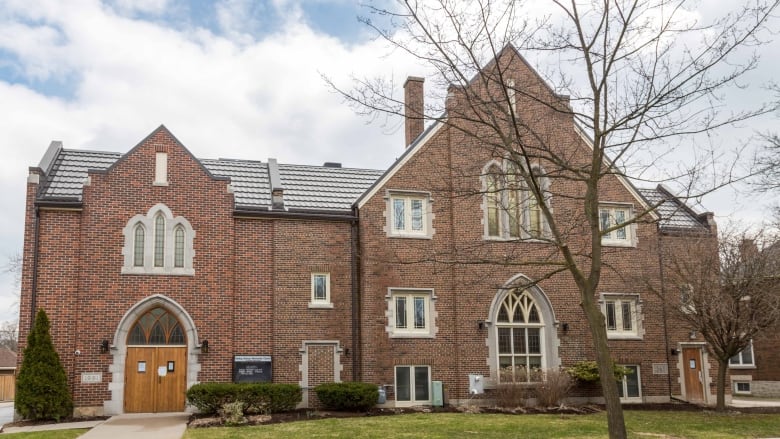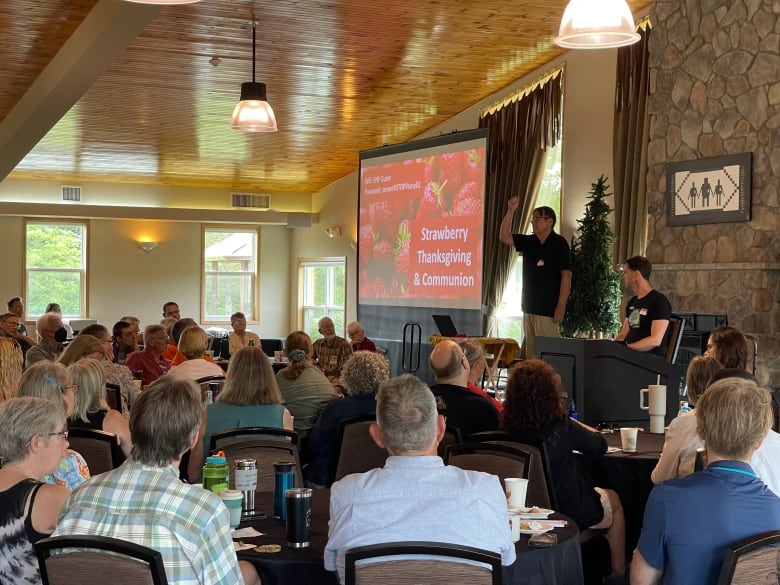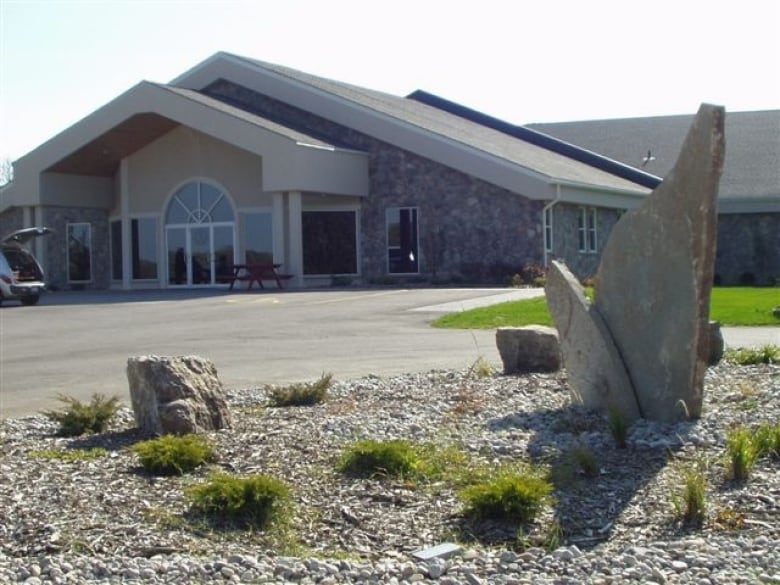This Kitchener, Ont., church uses portion of its budget for Indigenous reparations for 'harm done'
Stirling Avenue Mennonite Church among 4 in Canada paying reparations for being on Indigenous land

A Mennonite church in Kitchener, Ont.,among four in Canadapaying reparations to Indigenous people on whose land their church buildings are located, says its payments arepart of efforts to "repair past wrongs."
On July 6, Stirling Avenue Mennonite Church made its first payment of $4,000, representing one per cent of the church's annual budget.
Pam Albrecht, a member of the church's spiritual covenant working group, said the payment went to Six Nations Polytechnic a post-secondary educational institution in Brantford.
"This is in the spirit of reparationand acknowledging that there was harm done," Albrecht told CBC.
"We are making a payment, making an effort, in a small way, of trying to repair past wrongs We've got a lot of work to do, and we see this as a starting point."
Albrecht said people at the church have been on "a fairly long journey of learning" and talking about what kindof actions they could take related to reconciliation.

It was back in the spring of 2007 that two elders at Six Nations of the Grand River Adrian Jacobs and Rick Hill proposed a spiritual covenant between Canadian churches and the First Nations that first occupied the land on which the churches are built.
Jacobs, a member of the Six Nations Haudenosaunee Confederacy of the Grand River Territory in Ontario,said he began having conversations with the Mennonite community that year about "a spiritual covenant with churches."
'Doing what's right'
Kitchener's Stirling Avenue Mennonite Church was the first one visited by Jacobs, who also served as community liaison for Mennonite Central Committee, Ontario.
The church is on Block Two of the Haldimand Tract, which was proclaimed in 1874. Indigenous people who were part of Six Nations were told they would receive lease payments from those who came to reside on the tract.
According to Albrecht, those who came to live on the tract "paid lease payments to an Indian agent who was to then pass those payments on to Six Nations. The Indian agent never did that."
Jacobs said the Mennonites understood the original idea of leasing landand they also understoodthere was "no real reckoning for over 150 years."
The Mennonites decided, "as a step to deal with the inequity [and] the failure to fulfil Six Nations's original intentions, this spiritual covenant would be saying we want to be a part of doing what's right," Jacobs said.
Beginning of something 'really, really good'
The church's first payment was made at the Strawberry Thanksgiving and Communion, held on Six Nations of the Grand River in Brantfordin July.
"We had a celebration there where we were talking about the spiritual covenant. We had strawberries, so we offered thanks in our Haudenosaunee thanksgiving address for the strawberry as our first fruit," Jacobs said.
"But then we also included a communion, which in Christian terms is a commitment to covenant It was something that was saying we are in relationship, and we have these responsibilities to one another.
"So, when Stirling Avenue [Mennonite Church] brought $4,000, one per cent of their annual income, as their first step toward the covenant, it was the beginning of something that was really, really good," added Jacobs.

According to Jacobs, the Six Nations Polytechnic was the right fit to receive the payment on behalf of Six Nations.
"It has a bachelor [degree] in Cayuga and Mohawk available to people who want to pursue that," he said.
"It's a part of the Canadian educational system, but it also has the Haudenosaunee Knowledge Centre, which features our traditional knowledge that is being restored, and our elders are there as leaders and knowledge keepers who are sharing the language, sharing the culture, sharing the things that were really destroyed by the Indian residential school system and the colonial system."
Jacobs said Six Nations Polytechnic is "a unique, non-partisan" place, and "outsiders who are giving to the spiritual covenant would be able to benefit Six Nations people in general without getting into a political kind of controversy."
The Six Nations Polytechnic is also a non-profit organization and can receive payments and issue tax receipts back to donors, Jacobs said.
Rebecca Jamieson, president of Six Nations Polytechnic, told CBCin an email that the church's donation is "very much appreciated," and will go toward language revitalization efforts through programs like the bachelor and honours bachelor of arts in Ogwehoweh languages and a Cayuga immersion language program.
"The donations are ademonstration of the growing will to respond to the many calls for an equitable and fair resolution of Six Nations outstanding grievances related to lands, and as such, signal hope for building mutually beneficial relationships all those who share this land," Jamieson said.

Jacobs said three other churches all in Winnipeg also followed the approach of Kitchener's Stirling Avenue Mennonite Church.
Home Street Mennonite Church and Charleswood Mennonite Church, for instance,each donate $3,600 one per cent of their budgets to local Indigenous organizations.
We wanted to push ourselves a bit, which is why we added in the one per cent of our budget.- Lynell Bergen, lead pastor, Hope Mennonite Church, Winnipeg
Charleswood Mennonite Church said in a statement on its website that its decision to work in reconciliation and land reparation with Indigenous peoplegrew out of a strongly expressed desire in the congregation.
"To avoid past colonial patterns of power imbalance, we committed ourselves to self-education, relationship building, and openness to invitations to participate in actions of solidarity," the statement says. "We rely on related Mennonite agencies, and others, to connect us with local Indigenous groups who may be open to engaging with us."
Hope Mennonite Church, also in Winnipeg, has been giving a combination of one per cent of the value of the rooms it rents at a local church, plus one per cent of its budget, to local Indigenous organizations since 2022.
"When we started with the one per cent [of the value of the rooms],it seemed rather inadequate, and we wanted to push ourselves a bit, which is why we added in the one per cent of our budget," the lead pastor,Lynell Bergen, told CBC News."It was a way of coming up with a number that seemed both significant and manageable."
The church's treasurer, Stephen Nighswander-Rempel, said the congregation pays$2,500 per year.












_(720p).jpg)


 OFFICIAL HD MUSIC VIDEO.jpg)
.jpg)



























































































